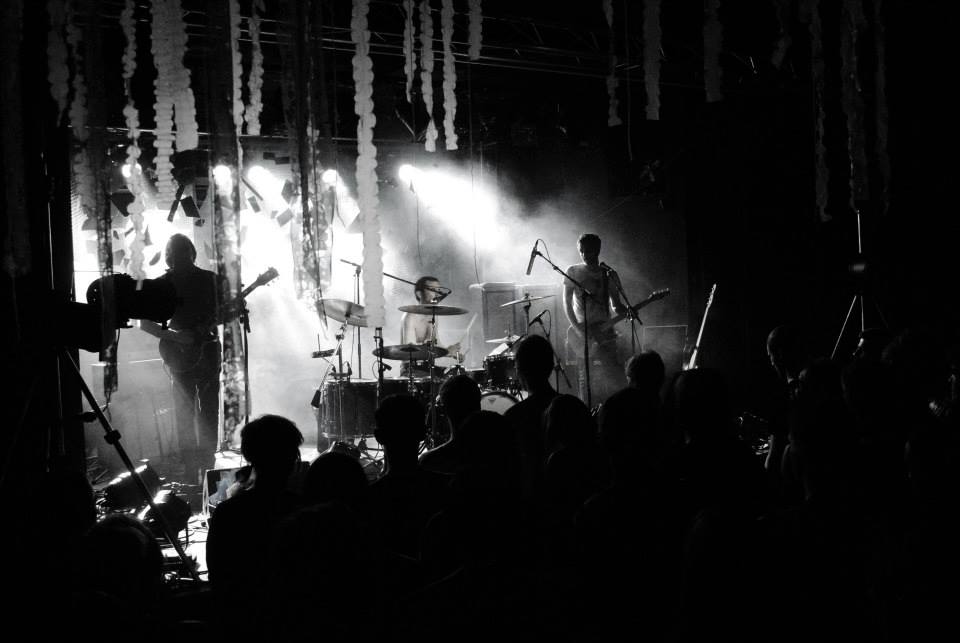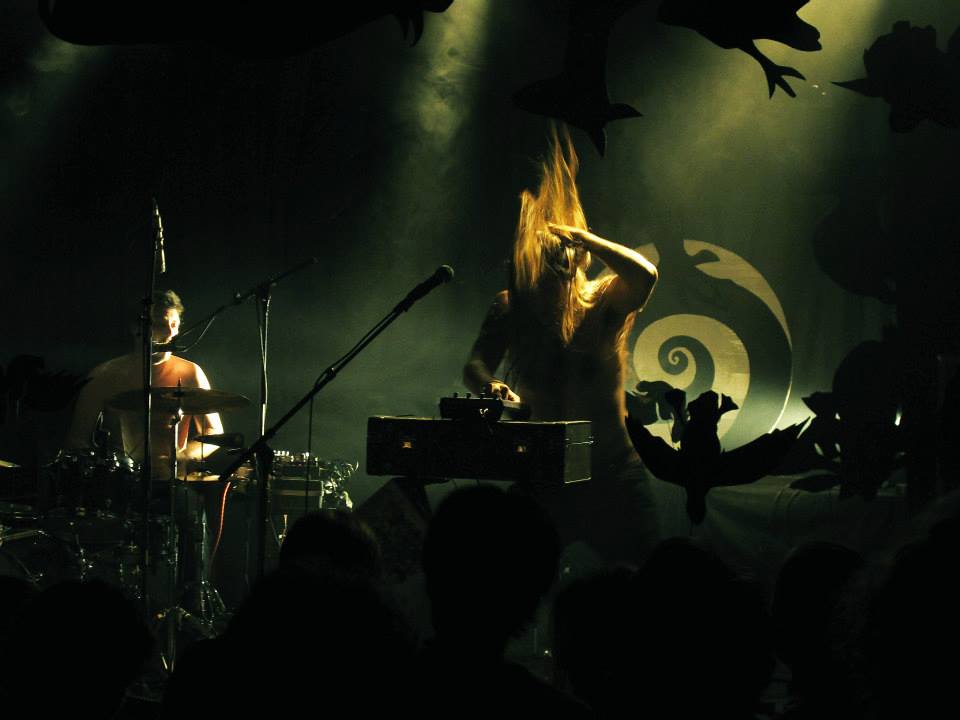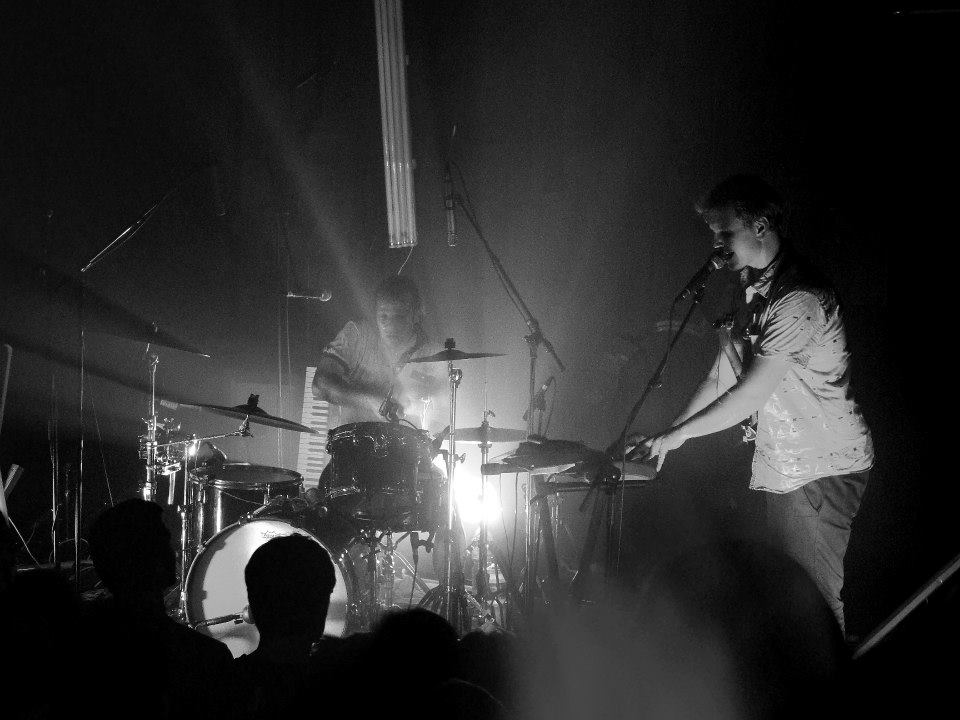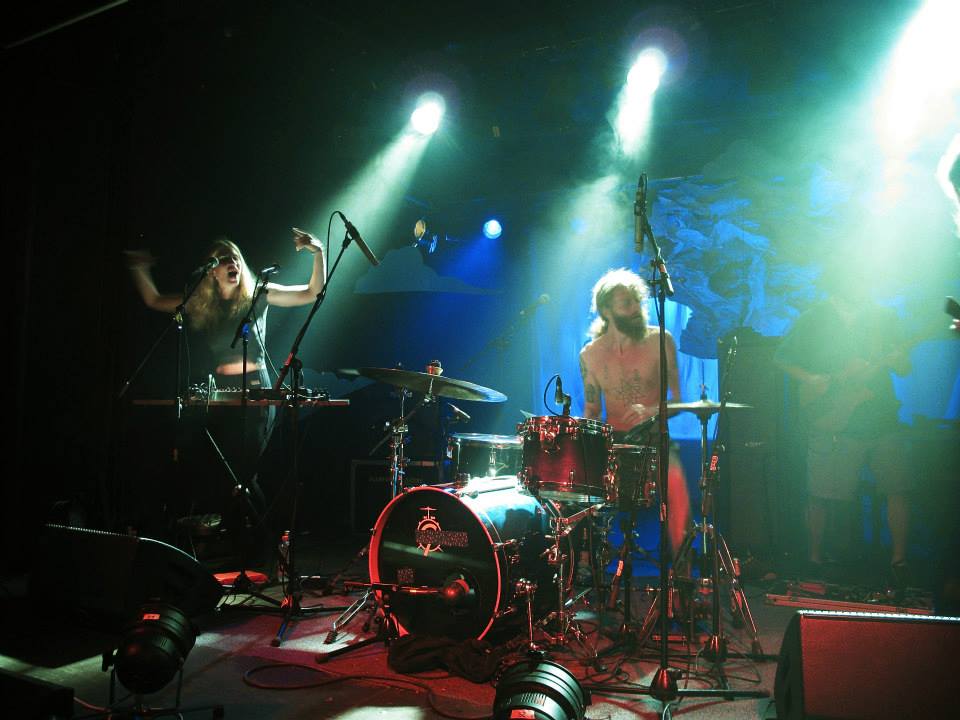Interview: ZA!
P=Papa Duau
E=Spazzfrica Ehd
BPM: Wanananai is a starkly more compressed and tangible than the first two albums, without sacrificing melody, quality or technicality. It has a sound that is more, comprehensible, the feeling of which one gets particularly after watching the video for Subeme el Monitor. How did you come to that shift, consciously or by accident?
P: I think the second option. We don’t um… make decisions.
E: Yeah, normally we thinking of things when we are interviewed. Like, “OK, its true, it does sound like that.” Especially with this one, we had, just one month before the recording, just a fistful of songs.
P: We had no idea, we knew one song, but the other songs weren’t even really songs yet.
E: When we started recording, we knew that it was the most chaotic album we had ever made. When we had finished the first session, the guy who does the recording gave us a rough mix, and when we listened to it on the way home we thought, ‘wow, it works, there are some Asian songs…’
P: …and some groovy songs. With the vinyl, we divided in two, one side, which is more Asian songs, like ‘CHA CHA CHAAA’ and a few others, and then the other album is just more groovy. By the way, our sound engineer, Santi Gartia, it responsible for giving the albumt he punch, I think he is probably the best sound engineer in the south of Europe. The Thick guitar tones I get are not mine, but something he puts together.
BPM: Regarding briefly CHA CHA CHAAAA, it was awesome how you quoted yourself from the first album.
E: Yeah! You noticed man, it was like a Black Sabbath take on it. Lots of fun.
BPM: Regarding the original song, which one of you was throat singing on that?
P: That was me.
BPM: Where did you learn to do that?
P: I just saw that documentary where Pulpina travels to Tuva, an got so impressed that I spent a bunch of time with my friend in high school trying to learn, but just screwing up, but then when I was working in a factory where there was a lot of sound I had a lot of time to practice, and then *awesome throat singing ensues*.
BPM: Yeah it was definitely impressive.
P: Yeah, but I’m faking it man.
E: Yeah, you need to have horses to do stuff like that…
P: Its funny, that song actually speaks about something pretty universal. In western culture maybe, you would say ‘this is my car and this is my girl, and you know, I’m the man’. This song is about ‘this is my horse, I am here in my field, the sound is everywhere, and I don’t know what to do, whether to go with my girl, or ride with my horse through the field’. And in this song, the guy decides to go with the horse.
E: Yeah, you can definitely hear him gallop off, in the middle of the song.
BPM: So, even thought I don’t speak Spanish, I am pretty sure the SPAZZFRICA is not a real word.
E: Oh yeah man, it doesn’t exist. Uhm, we made up names, I don’t know why, mine, SPAZZFRICA, well, you know the band Spas? Well, during shows I got in the habit of mixing the voice of the singer from Spaz with the voice of this crappy South American electronic musicians voice, King Africa, and it was a lot of fun. So then, Spazzfrica…
BPM: So, in ZA!, I personally encounter a lot of humor; I can just see you both having so much fun when I am listening. What do you guys think about humor in music. Does it belong?
P: I don’t know, I think it has to do with the playfulness of music. With music, you can play with the structures, the sounds, and also the ideas. For us, we often hear a sound, and make fun of it, and think ‘man that’s super shitty’, and then we use it.
E: Yeah, its kind of a part of experimental music. When you experiment, you try things, and you often get weird funny stuff. So you laugh, ‘haha, what a shit’, and then use it for something.
P: It’s definitely a lot different than folk songs, these songs aren’t just the stories that have already been told, these are a new story.
BPM: So what story is ZA! Telling?
E: Literally, we just take things from what we live. For instance, ‘Hotto!, Hottero!, and Hottesto!’ are from a time when we played with a Japanese band in Barcelona, and you know, the Japanese speak English in a funny way, so this guy tried to stay ‘hot, hotter, and hottest’, and so we just ran with it. And we also like to make up new words, so, yeah. Aside from the literal story, we just like to talk about freedom. Freedom from structure.
P: You know, just talking about having as much fun as you can. Music is about history. Oh by the way, we are planning to make a book. You know, Edu, has a really interesting idea about the world.
E: So El Mundo Estrella, so the star world, and, wait, have you played Super Mario world?
BPM: Of course.
E: So, you could just play the game regularly, or you could go to a hidden world, through the stars, and get to the same end with a completely different route. It’s a completely different way of seeing the world. So, for example, what I know of Germany is here, these people, SchnAAk, and this community. What I know of America, is the people we have met in Chicago at treasure town, and playing with Many Arms and staying with Ricardo. I don’t know about the world that make the news, what is in encyclopedias.
P: Yeah, so, the book is about, well, lets ask those people to write something about Starworld. Like, we would have a minister of Gastronomy, a minister of philosophy in Starworld.
BPM: Very cool, definitely looking forward to it. Just wrap things up, people know Barcelona for techno in clubs. How did you come out of Barcelona?
E: There are always people who can expand your thoughts and music tastes. So Pau discovered a lot of non-Western music through his brother, and just got into it. And then you mix it with a film you saw, and then mix it with grunge and stuff, then share a stage with another band, and then wow, where did you come from?
P: Exactly, where di you come from? How did you get here?
E: traveling, coming from different places, has been super-enriching.
P: Inputs start to compound, and expand, and influence each other, and fit together better, as you grow and travel.
Interview: SchnAAk
M=Mathias
J=Josen
BPM: So, when I learned about this Festival the website, I got the impression that SchnAAk was the big feature here. Almost as if you are the flagship for the record label and the show.
J:I don’t feel that way.
M: Yeah, not really.
J: its not like we are the band or something, we are part of a lot of bands, which are playing here. And I personally am really excited to see all of them
BPM: Do think that maybe other record labels and festivals would have pressed on SchnAAk more?
M: No, I think this festival is important because of the mixture. People discover music scenes through different ways, and there are a lot here. We have crazy loud, and indie all on the same stage. That’s what is special for me. I love hearing different things coming together as one.
BPM: One hears that clearly in SchnAAk’s music. You guys have changed from the first EP, which was pretty classifiable to something completely unidentifiable. How’d that work?
J: We took more time, we got serious.
M: We started thinking about composing more, we started singing and writing songs about things we were doing.
J: You know, the EP was just about a feeling, but the later songs were more about ideas, and change, and for me that is the most important thing about writing.
M: That’s the big question, what next.
J: Yeah, that’s the big question now, and that’s why we did this Rundu Choir stuff. You know, what can we do differently, what can we do live as a duo. These sorts of things. There is still a lot of space left. Maybe after the next record we have to expand, maybe other musicians, but for now, there is still stuff we can do in other directions.
BPM: How do you manage to play live, there are a lot of layers in your music.
M: You know, we have a lot of samplers here, and we both use them, and its much more difficult then when we were just drums and guitar. Its more about multitasking. You can’t put all things on stage.
J: You know, you can’t put a string quartet on stage. Its important for us to be minimalistic; if we can’t do it as a duo, we aren’t going to do it. WE can’t have backing people for this music. We can’t use computers or anything like that.
BPM: A lot of two pieces try to make more sound than you would expect out of two people, yet you are definitely in a minimalistic approach.
J: I learned a lot of from Mathias’ composing. Originally, I was thinking of writing one part, and then layering, but now, we are spreading the ideas out and not clumping them all together.
M: Especially with our music, we are often told we sound like six people, but I think its better to sound more like one person. And that’s how we try to think about it.
BPM: So you have a new album coming out. You (Mathias) spent a lot of time in Africa, and now you are working with something called the Rundu Choir. What exactly will people hear when they turn this on? What is the Rundu Choir?
M: We see this as, a completely different entity. We didn’t even think about calling it SchnAAk until we wanted to indicate that it was us. It has nothing to with SchnAAk, it may be in a completely different ‘scene’. Maybe with this, if we play and electronic festival, people will listen to the original sound and vice versa.
J: We were going to call it Jackson Boogoe, but then, you know.
M: Part of this is trying to get more and more projects under one name, maybe other musicians.
BPM: Would you want to incorporate any musicians here?
M: there are loads of good musicians here, so many of them. We are also planning remixes and other such things of the Rundu Choir. The intention was to involve, as many possible different musicians from different genres.
S; What is the Rundu Choir?
M: So, I lived the last year in Africa, in a city called Rundu. Rundu is just for me, and image, and the music sounds to me like those two words ‘Rundu Choir’. Its just an image.
BPM: So there are no new people?
M: No, its just us.
BPM: Well damn.
Interview: Guardian Alien
G=Greg Fox
A=Alex
E=Eli
B=Bernard
BPM: SO is this Guardian Aliens first EU tour?
G: yeah, we have come individually, but as a group this is our first time here.
BPM: How’d you guys get hooked up with Discoporate?
G: Just through our booking agent. We have a lot of mutual friends too, they put out Buke and Gase, and we know them. Ultimately, like most things, it was the booking agent. A lot of times it is a personal connection, and I personally have worked this woman many times, and so its not just a booking agency.
BPM: So, in terms of a DIY space, how do you feel about it relative to New York?
G: There is definitely still a strong DIY in New York, maybe not in Todd P’s places on Kent Ave, but Death by Audio is still great. The DIY on Kent is a concurrent thing though, but its really dependent on the commonality. I have always felt that touring Europe is an extremely welcoming experience. Definitely a different kind of audience.
E: I love the attention to detail here, but I definitely don’t want to compare it to any other scene. Its just a beautiful moment for me.
G: There’s definitely a lot of anti-Fascist graffiti here in Dresden. I personally find that very comforting; its beyond graffiti or tags or whatever, it’s a message speaking about the mentality of the city, of a generation. Beyond the city. I personally feel so comfortable here with that sort of message. And it feels great to be part of that.
BPM: How do you feel Guardian Alien fits into the musical expression here? In the US, there is almost a sense of being jaded with music as political or existential expression, yet here we are, and here you are.
B: There is definitely that feeling, but I personally feel it has to do with changing the self, and music can definitely do that. I mean, we are practically a different band every night.
BPM: Guardian Alien definitely thrives on change. How did you come to style of creation, how do oyu feel relative to other more composed bands.
G: I just can’t play the same show every night, and I don’t necessarily feel that its relative to anyone else. We have a strong internal dialogue, and while we value improvised music highly, improvised music takes a lot of different forms, and we are trying to do improvised music without doing something redundant.
BPM: It makes a lot of sense that you are part of this scene, but there is definitely a degree to which you stand out, and are special.
A: That’s exactly how they presented us at Primavera, maybe we are just providing that function wherever we go…
BPM: So drastically changing the subject, lineup change?
G: Well Turner went to art school to get his MFA. It was just time.
E: We will definitely play with Turner again.
BPM: Are there going to be any new records soon?
G: We already have one recorded that will come out in November, and we are already working on a new one, which will probably come out in may, so yeah. We are definitely doing new things, going to put out a lot of new stuff soon. I mean, that’s the plan. ‘Man plans and the universe laughs’ or some shit like that, but hopefully everything goes the way it’s supposed.




